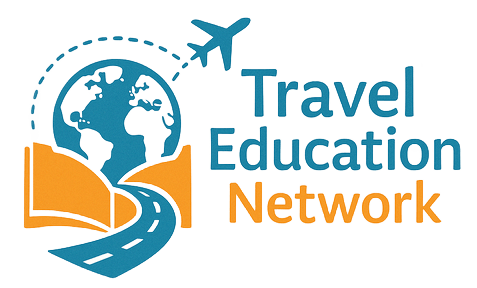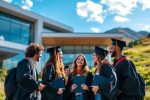Why Travel Is Beneficial to Education: The Science Behind Learning Abroad
Want to boost your education and personal growth? Discover the transformative power of travel! From experiencing diverse cultures and fostering independence to enhancing academic learning and critical thinking, travel offers invaluable benefits. Explore how connecting classroom learning with real-world experiences deepens understanding and sparks curiosity. Start your journey towards a richer, more holistic education today!
Important information

- Travel boosts academic learning by connecting classroom knowledge with real-world experiences, leading to a deeper understanding.
- Navigating new environments builds valuable life skills like independence, problem-solving, and adaptability.
- Exposure to diverse cultures and perspectives encourages critical thinking and challenges preconceived notions, broadening worldviews.
- Cultural immersion through travel enhances language skills and fosters cross-cultural communication and empathy.
- Travel experiences, including field trips, provide hands-on learning opportunities that reinforce academic concepts and inspire curiosity.
Why Travel Is Beneficial to Education
Travel offers incredible educational benefits, exposing students to diverse cultures and traditions and broadening their understanding of the world. It fosters independence and builds problem-solving skills as students navigate unfamiliar environments, encouraging resourcefulness. Travel also enriches academic growth by providing real-world context and enhancing cultural awareness. This adaptability becomes a valuable asset in both personal and academic pursuits. Experiencing diverse perspectives challenges preconceived notions and encourages critical thinking. Moreover, travel connects classroom learning with tangible experiences, deepening understanding and inspiring curiosity. These enriching encounters promote personal growth and contribute to a more holistic education.
Benefits of Educational Travel
- Exposure to diverse cultures and traditions, broadening world understanding.
- Fosters independence and builds problem-solving skills in unfamiliar environments.
- Enriches academic growth by providing real-world context.
Impact on Personal Development
- Enhances cultural awareness and adaptability.
- Challenges preconceived notions and encourages critical thinking.
- Connects classroom learning with tangible experiences, deepening understanding.
Cultural Discovery and Awareness
Traveling broadens your horizons by exposing you to diverse cultures and communities. Firsthand experiences offer unique insights into different customs and traditions, going far beyond textbook learning. For example, culinary tours provide immersive opportunities to connect with locals through shared meals, fostering understanding and appreciation. This global perspective nurtures personal growth, challenging you to adapt to new situations and develop a wider worldview. However, responsible travel is paramount, emphasizing respect for local customs.
Emotional and Social Skills Development
Traveling to new destinations cultivates emotional intelligence and enhances social skills. Immersing yourself in diverse cultures fosters empathy and broadens your perspectives. Navigating unfamiliar social situations hones essential interpersonal skills, such as effective communication and adaptability. These experiences nurture emotional maturity and resilience. Furthermore, travel boosts self-awareness and confidence, which are crucial for personal and professional growth. Ultimately, travel significantly enriches your life.
Real World Skills and Academic Enrichment
Traveling fosters essential life skills. Students learn to budget, adapt, and navigate unfamiliar situations while managing finances, which strengthens their problem-solving abilities. Furthermore, travel enriches academic learning by exposing students to diverse cultures, broadening their understanding and directly benefiting their studies. It also fuels personal growth, boosting self-confidence and independence as students become more resourceful and self-reliant. Travel is a powerful catalyst for personal and academic development that extends far beyond sightseeing.
The Science Behind Learning Abroad
Studying abroad offers significant cognitive benefits. Navigating new cultures boosts cognitive flexibility, sharpening problem-solving skills and adaptability. Exposure to diverse perspectives encourages critical thinking, ultimately improving academic performance and career prospects.
International experiences also enhance creativity. Students encounter new artistic expressions and cultural nuances, learning different ways of thinking. Travel promotes adaptability, which improves creative problem-solving. Stepping outside your comfort zone sparks curiosity, inspiring new ideas and boosting creative potential.
Furthermore, travel plays a key role in academic growth. Learning abroad connects studies to real-world situations, deepening understanding and engagement. Internships and field trips provide practical skills and improve knowledge application. Exposure to global perspectives broadens academic horizons and fosters a global mindset.
Cognitive Benefits of Studying Abroad
Studying abroad offers significant academic benefits. It allows students to earn degree credits, often through specialized courses not available at their home institutions. This expands their academic horizons and provides them with specialized knowledge, ultimately making them more competitive in their field.
Enhancing Creativity Through Travel
Traveling boosts creativity by exposing you to new sights, sounds, and experiences. Immersing yourself in different cultures enhances problem-solving skills and sparks innovative thinking. Connecting with diverse perspectives broadens your understanding and fosters fresh ideas, enriching your creative work. Novel experiences challenge your mind, increasing cognitive flexibility and encouraging creative solutions in various fields, from academic pursuits to artistic expression.
The Role of Travel in Academic Growth
Traveling offers invaluable benefits for academic development. Exploring new places broadens students’ understanding of their chosen field by exposing them to diverse educational systems and varied learning environments. This experience cultivates a global perspective, enhancing critical thinking and challenging preconceived notions. Adapting to new situations encourages flexibility and broadens their understanding, ultimately fostering academic growth.
Experiential Learning and Educational Opportunities
Experiential learning immerses students in new cultures, allowing them to develop language skills through real-world interactions. This invaluable experience fosters cross-cultural communication and empathy as students encounter diverse perspectives, gaining a deeper understanding of global issues and broadening their horizons.
- Develop language skills through real-world interactions.
- Foster cross-cultural communication and empathy.
- Gain a deeper understanding of global issues.
Field trips bring classroom lessons to life by offering hands-on experiences. Students can visit historical sites or explore scientific landmarks like the Royal Greenwich Observatory or CERN. This interdisciplinary approach connects different subjects, encouraging critical thinking and enabling students to apply their knowledge practically, strengthening their understanding.
- Bring classroom lessons to life with hands-on experiences.
- Visit historical sites and scientific landmarks.
- Connect different subjects and encourage critical thinking.
Cultural Immersion and Language Proficiency
Studying abroad significantly boosts language learning through full cultural immersion. Daily life transforms into a learning experience, accelerating fluency with constant, real-world practice. Direct interaction with native speakers provides a deeper cultural understanding, including slang and body language nuances that textbooks often miss. This immersive experience reinforces learning and cultivates essential cross-cultural skills.
Cross-Cultural Communication and Empathy
Traveling to new places fosters empathy by introducing you to different people and cultures, which helps build strong social skills and relationships. Experiencing unfamiliar languages and customs improves communication skills and broadens your understanding of the world, strengthening your ability to empathize with others. These experiences also increase adaptability and language proficiency, making them incredibly valuable.
Field Trips and Interdisciplinary Learning
Field trips transform classroom lessons into real-world adventures. Students explore diverse subjects like history, science, and art in practical settings, making learning tangible. For instance, a visit to a historical site reinforces history and social studies concepts, bringing the past to life. Similarly, exploring a nature reserve enhances biology and environmental science understanding through firsthand observation. These travel experiences foster critical thinking and problem-solving skills, offering invaluable learning opportunities.















